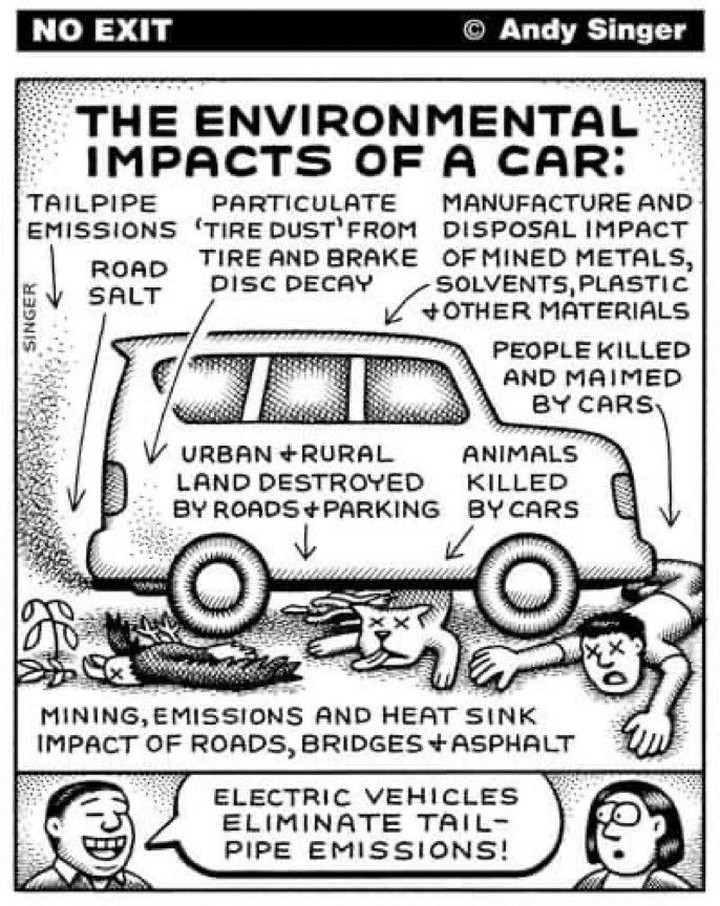view the rest of the comments
Fuck Cars
This community exists as a sister community/copycat community to the r/fuckcars subreddit.
This community exists for the following reasons:
- to raise awareness around the dangers, inefficiencies and injustice that can come from car dependence.
- to allow a place to discuss and promote more healthy transport methods and ways of living.
You can find the Matrix chat room for this community here.
Rules
-
Be nice to each other. Being aggressive or inflammatory towards other users will get you banned. Name calling or obvious trolling falls under that. Hate cars, hate the system, but not people. While some drivers definitely deserve some hate, most of them didn't choose car-centric life out of free will.
-
No bigotry or hate. Racism, transphobia, misogyny, ableism, homophobia, chauvinism, fat-shaming, body-shaming, stigmatization of people experiencing homeless or substance users, etc. are not tolerated. Don't use slurs. You can laugh at someone's fragile masculinity without associating it with their body. The correlation between car-culture and body weight is not an excuse for fat-shaming.
-
Stay on-topic. Submissions should be on-topic to the externalities of car culture in urban development and communities globally. Posting about alternatives to cars and car culture is fine. Don't post literal car fucking.
-
No traffic violence. Do not post depictions of traffic violence. NSFW or NSFL posts are not allowed. Gawking at crashes is not allowed. Be respectful to people who are a victim of traffic violence or otherwise traumatized by it. News articles about crashes and statistics about traffic violence are allowed. Glorifying traffic violence will get you banned.
-
No reposts. Before sharing, check if your post isn't a repost. Reposts that add something new are fine. Reposts that are sharing content from somewhere else are fine too.
-
No misinformation. Masks and vaccines save lives during a pandemic, climate change is real and anthropogenic - and denial of these and other established facts will get you banned. False or highly speculative titles will get your post deleted.
-
No harassment. Posts that (may) cause harassment, dogpiling or brigading, intentionally or not, will be removed. Please do not post screenshots containing uncensored usernames. Actual harassment, dogpiling or brigading is a bannable offence.
Please report posts and comments that violate our rules.

You could also potentially use them as a solution for more efficiently allocating energy, less by pumping energy back into the grid, and more by running home power from the car battery during peak hours, rather than having to produce too much energy during off hours, having to shut down the power during peak hours or provide limited access, or having to provide power for less people. You can make the power go further, and especially for renewables which have potentially less consistent energy production (the nice part being that peak demand roughly lines up with peak production for solar power, at least, in the summer). But none of that's really an attractive proposition to the american car buyer who wants to travel as far as possible at the drop of a hat, and you have to make car batteries larger and the cars themselves less efficient to compensate for this power draw and power storage that may or may not be happening at any given moment, so it's sort of self-defeating with the american car market.
Obviously, it isn't really a more equitable or more efficient solution broadly than doing something like pumping water uphill. Or trying to limit demand in the first place by decreasing surface area of homes, by moving towards multiple units in one building, increasing r-values by using better building materials you could shell out for with a larger amount of occupants, yadda yadda urban design garbage. Stuff that generally is antithetical to car-centric infrastructure and thus electric cars. You also potentially run into problems where the as the grid as a whole becomes less relied upon, they make less money, and then the grid starts to fail further in a positive feedback loop. Poor people can't afford rooftop solar and electric cars, because most of them can barely afford rent and aren't really the ones making those decisions anyways.